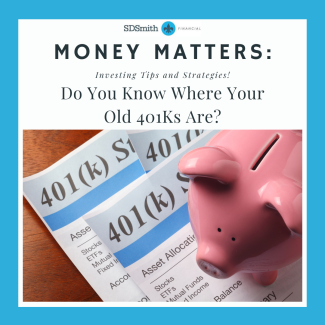
Do You Know Where Your Old 401Ks Are?
One of the greatest wealth builders in America is the 401(k). With its tax benefits and diverse investment options, it’s no wonder that the Ramsey Solutions Millionaire study found that 8 out of 10 millionaires invested in their company's 401(k) plans. However, many people forget about old 401(k) accounts when they change jobs. If you have an old plan (or two, or even six), what happens to those accounts, and how can you recover them? Once you do, what are your options?
Changing jobs can be stressful—new processes, new insurance, new colleagues, and new goals. Amid the whirlwind of resume building, applications, and interviews, it’s easy to put your retirement accounts on the back burner. As a financial advisor, one of my roles is to help people sort out these old accounts. While the process may seem extensive, getting organized can yield significant benefits.
What Happens to Your Old 401(k) Accounts?
There are several potential issues with neglected 401(k) accounts:
- Ongoing Fees: You may still be incurring various fees, such as administrative, service, and investment fees, on accounts you’re not actively managing.
- Account Closure: If your previous employer decides to terminate their plan, they might send you a check for your account balance. This could lead to hefty penalties and taxes if you’re under 59½ years old.
- Plan Changes: Employers can change their retirement plan providers or merge with other companies. If your previous employer switches plans, they may choose not to move the accounts of former employees, leaving you at risk of losing track of your funds.
How to Recover Your Old 401(k)s
Fortunately, recovering your old 401(k) is easier than you might think. Here’s how to start:
- Identify Where Your 401(k) Is Held: If you remember your 401(k) being with TD Ameritrade, it’s likely now managed by Charles Schwab due to a merger. Search for the company's “401(k) Support” number to get in touch.
- Security Verification: When you call, they will ask security questions and use your Social Security number to locate your accounts.
- What If They Can't Find It?: If they can’t locate your 401(k) with your Social Security number, ask if you have an IRA instead. Your funds may have been rolled into an IRA and managed elsewhere.
During the call, aim to find out:
- Is the account active?
- What is the current balance?
- What is the account number?
- What is the online login information?
Once you have this information, you can use the "forgot password" tool to access your account.
What to Do with Your Found 401(k)s
Once you locate your 401(k) accounts, you have four options:
- Leave It There: If your old account is performing well, and you’re satisfied with the fees and investment options, this could be a viable choice.
- Move It to Your New Employer: Check if your current employer's plan allows you to transfer your old 401(k) into your new one. This option can be convenient but will subject you to your new plan's limitations.
- Cash Payout: While you can withdraw the funds, be aware of the hefty taxes and penalties that may apply. Consult with a tax advisor to see if this is the right choice for you.
- Rollover to an IRA: You can move funds from a traditional, Roth, or after-tax 401(k) into an IRA. Properly executed rollovers won’t incur tax consequences and will provide you with broader investment options.
Take Control of Your Retirement
If you're tired of juggling multiple statements, losing potential earnings from poor investment options, or simply want to get organized, we can help.
Set up a call today using the link below, and let’s explore how consolidating your old 401(k)s can benefit you.

